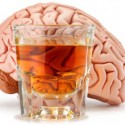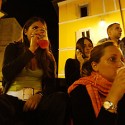One for the road? Film forces France to admit its drinking problem
One for the Road, the real-life story of a journalist’s battle with alcohol, sparks debate over the country’s self-image as a nation of moderate wine-lovers
The posters, on hoardings across France, show a slightly dishevelled media executive in his 50s, on a jetty, a bag in his hand, a Swiss lake behind, staring with vacant, battered, tired eyes into the middle distance.
He is an unlikely hero, but Hervé Chabalier, author of the book One for the Road (Le dernier pour la route), was being lauded by French journalists last week after a film based on his battle with alcoholism came out to critical acclaim. “Truthful, clear and sober,” said the Nouvel Observateur weekly magazine. A story that is “profoundly human”, said the mass-circulation daily Ouest-France.
But the film, in which Chabalier is played by François Cluzet, has gone beyond simple entertainment, provoking an unprecedented debate on alcoholism, long a taboo subject in France.
Chabalier, 67, founder of the press agency Capa and a renowned foreign correspondent, has not drunk for seven years since the treatment for alcoholism on which the film is based. He said that there was “denial” of the problem in his native land.
“Everywhere you are pushed to drink. It is a very strong social symbol. For having fun, for crying, there is alcohol. It is part of France. But the moment it goes too far, then you are cast out,” he told the Observer. “People don’t want to talk about it or recognise it.”
Though the French are often seen, and see themselves, as a nation of moderate drinkers, certainly compared with Britons, statistics reveal similar levels of alcohol consumption and dependence. According to Inserm, a French public health research centre, five million French people have medical, psychological or social problems linked to alcohol abuse and at least two million are dependent – levels comparable with anywhere in Europe.
“National stereotypes strongly affect how alcoholism is viewed,” said Dr Philippe Batel, a practising psychiatrist in Paris and an author. “Here we see our own alcohol consumption as part of our culture of l’art de vivre, of our history as a wine-producing country, and as part of our treasured gastronomy. We look at drinking in Britain and see a simple desire to get drunk.
“But in fact these cultural models are totally false. In the UK, alcoholism is more visible. In France, it stays hidden. But the levels are the same.”
The new film is also about alcoholism as an illness, not a social problem, Chabalier says. One of the reasons he wanted to tell his story was that it is “so typical”.
“We have an idea of the alcoholic as the smelly guy in the gutter. But I’ve had a very successful life professionally. I could go to work and spend a day in a state of semi-permanent inebriation without difficulty. Alcoholics are very good at hiding things. It was only at the end that things got out of hand.”
His book, which sold 150,000 copies, was written from notes taken during his stay in a Swiss clinic.
“I jotted things down to remember them to help me when I had left, and that became a diary which became the book. I had a huge response. People were writing to me saying that now they could talk about their illness with their wives or husbands.
“Alcoholics think they can deal with their problem themselves but they can’t. They need to get help.”
According to the French Observatory on Drugs and Drugs Addiction, the proportion of French adults having or having had a problem with alcohol use has been stable since the early 1990s and in terms of overall consumption the French drink around 10% more units of alcohol each year than the British. Those most at risk of alcoholism were men in managerial jobs aged between 45 and 60. One phenomenon increasingly visible in France, especially among young people, is “binge-drinking”, though it is remains a relatively minor problem.
Last year an attempt by the government to ban clubs and bars from offering evenings of unlimited drinks on payment of a fixed ticket price provoked a revolt from wine-makers, who said it would mean the end of wine-tasting events and accused the government of “undermining our national heritage”.
France, like Norway, already has a total ban on all alcohol advertising on television and billboards. Recently the issue of internet advertising has provoked new arguments.
The fight against alcoholism in France has a long history. A report in the New York Times told readers of a congress held in Paris “to deliberate upon means to eradicate the evil of excessive alcohol consumption in the republic”.
“Eminent men of letters and clergy of various denominations [were] joining hands in a fight against the common foe,” the newspaper’s reporter said. The date was 24 January 1904.
source: The Observer


